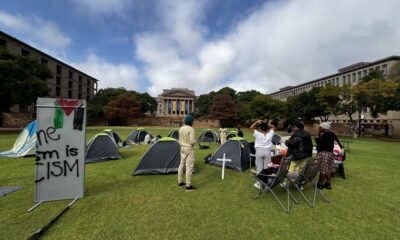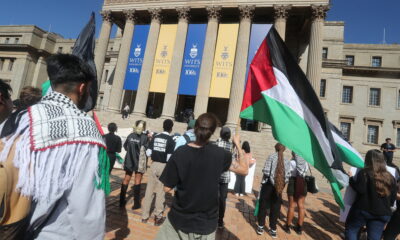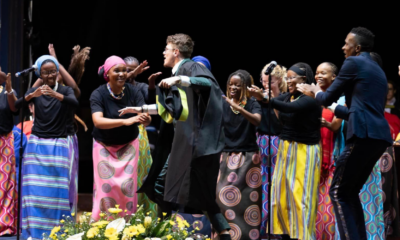
Featured Item

Scientists dedicate lives to dealing with death
Death may be one of the last taboo topics, but for two Jewish scientists working at the forefront of forensics in South Africa, it’s something they see every day.
“The dead have so much to teach the living,” says Professor Ryan Blumenthal, senior specialist forensic pathologist and associate professor at the University of Pretoria’s department of forensic medicine.
“From my autopsy table, I have a relatively good idea of what’s happening in the world,” he says. “I can tell you if a new gang has moved into the neighbourhood. I can tell you if there’s a new or emergent drug or disease. I can even tell you the health (physical, mental, and psychological) of the nation. I can tell you all this without even venturing outdoors.”
Meanwhile, from her office in the Johannesburg forensic pathology services medical legal mortuary in Hillbrow, Ildi Wainer says her work focuses on “teaching and moulding young minds for the future”. She works to “provide them with a reality of how forensic toxicology works in this country in 2022. It’s not like the TV show CSI. I wish I could run down the corridor in slow motion, but the reality is very different. It’s stark and sobering, but necessary.”
Forensic toxicology is the analysis of biological samples for the presence of toxins. These results can be used to determine a substance’s potential effect on an individual’s death, illness, or mental or physical impairment. Wainer spent years working in these trenches. “Ultimately, you test biological fluids and tissues,” she says. “The outcomes are submitted to some form of legal process: an inquest, insurance claim, or police investigation, so there are huge implications.”
Wainer then worked in a hospital setting before moving to academia. She’s now a medical scientist specialising in forensic toxicology, teaching in the department of forensic medicine and pathology at the University of the Witwatersrand (Wits) Faculty of Health Sciences.
“Working with the living and the dead are different,” she says. “When it comes to students, I try to inspire, educate, and convey my passion. Forensic pathologists aren’t born, they’re made. They’re medical doctors who have completed their community service and now choose this speciality. They do four to five extra years of training.”
When it comes to working with the dead, “there are a lot of cases. The Johannesburg mortuary where I work from deals with more than 3 500 cases a year, and we’re one of eight mortuaries in the southern Gauteng cluster. The pressure is great, especially for the likes of Professor Blumenthal and forensic pathologists. Resources are stretched. Understandably, the health department has a whole living population to worry about, but here are the dead, also calling out for resources.”

Blumenthal trained as a medical doctor but an encounter with a patient who refused to stop smoking made him feel he could make more of an impact on the dead than the living. This turning point is described in his book Autopsy – Life in the trenches with a forensic pathologist from Africa which became a non-fiction bestseller.
His chief field of interest is the pathology of lightning trauma (keraunopathology). He has published and educated widely in the fields of electrocution, suicide, and other areas involving the pathology of trauma. “My chief mission in life is to help advance forensic pathology services nationally and internationally,” he says.
“Forensics fascinated me from the start. In its purest form, forensics is about practical puzzle solving and the truth. There remains much injustice in this world. Some truly evil people share this planet with us. For those of you wanting a fight in life, I invite you to come and fight in this arena. Focus your aggressive tendencies towards the forces of darkness which beset this world. Forensic pathology isn’t some side show. It’s a main arena.
“My battle is personal,” he says. “I hate sickness, war, stupidity, ignorance, bullying, and human exploitation. That there are cheats and crooks in life goes without saying, but the great majority of human beings are essentially good. I feel I have a moral obligation to serve my immediate community and the greater community of humankind.
“Everyone benefits from our service,” says Blumenthal. “Forensic pathologists simply report on what we find at autopsy. We present our findings fairly, scientifically, and objectively. No one is ‘holier than thou’. I have seen political leaders and holy people die in nefarious circumstances. Once, I found a religious leader dead in a place of ill-repute. The police carelessly let it slip to his wife where her husband was found dead. The wife was so incensed, she said, ‘He must now bury himself!’ and stormed out. We were left with the unenviable task of managing the delicate matter of his funeral.”
Regarding cases that stand out, Wainer says, “In the past few weeks, we had a spate of Jewish people passing away. We had to deal with a lot of unnatural deaths, which was emotional and visceral. There have been a lot of young Jewish women who have died due to acts of suicide.”
Wainer says she’ll never get on a motorbike as the driver “always comes out second best”. She says shootings are a huge problem in this country. “The media may highlight 12 people killed in a tavern, but we see it on an ongoing basis. It’s like the Wild West. People are being shot multiple times. This is extremely labour-intensive work for forensic pathologists.”
Blumenthal says “forensics demands an optimistic philosophy towards life. You have to maintain a positive attitude about self and society, especially when dealing with death and dying, decomposing bodies, and tragedy on a daily basis. I always have plants in my office so that I can be surrounded by life, especially after spending my days surrounded by death.”
Ultimately, Wainer wants to make a difference. “A dead person cannot talk, and it’s our role to get scientific and medical clues about what could have led to that person passing away or the behaviour which may have contributed to their death. There’s a lot of silent investigative work. We’re only one piece of an entire investigative puzzle.”
Wainer has confronted death professionally and personally. Her husband, Clyde, passed away unexpectedly at the beginning of this year. His brother is Rabbi Shlomo Wainer of Chabad in Umhlanga. Her advice to others going through grief is “you have inner strength you can draw upon. We owe it to our loved ones to keep living and making a difference. Do the best you can, and make the best of every day, because not everyone has that opportunity.”
Like Wainer, Blumenthal is a passionate teacher. Both are committed to investing their expertise in the next generation of South Africans. Blumenthal has been teaching for 20 years at the University of Pretoria. “Students are smarter than we think,” he says, “and they learn best when challenged.” “Curricula should be in line with what’s happening in centres of excellence around the world. My unique contribution is that I create medical detectives and sceptics.
“What I tell young people about forensic pathology is that the hours are terrible, the pay is terrible, the conditions are terrible. You’re underappreciated, unsupported, disrespected, frequently physically endangered, but there’s no better career in the world!”











Desire Levin
August 26, 2022 at 5:59 am
I loved the article Scientists dedicate lives……. To death.
I
For me it is so real and down to earth and the attitude to death is amazing. The recignition of bad things in the world and how to deal with them is so down to earth. I too am a gardener for life understanding.